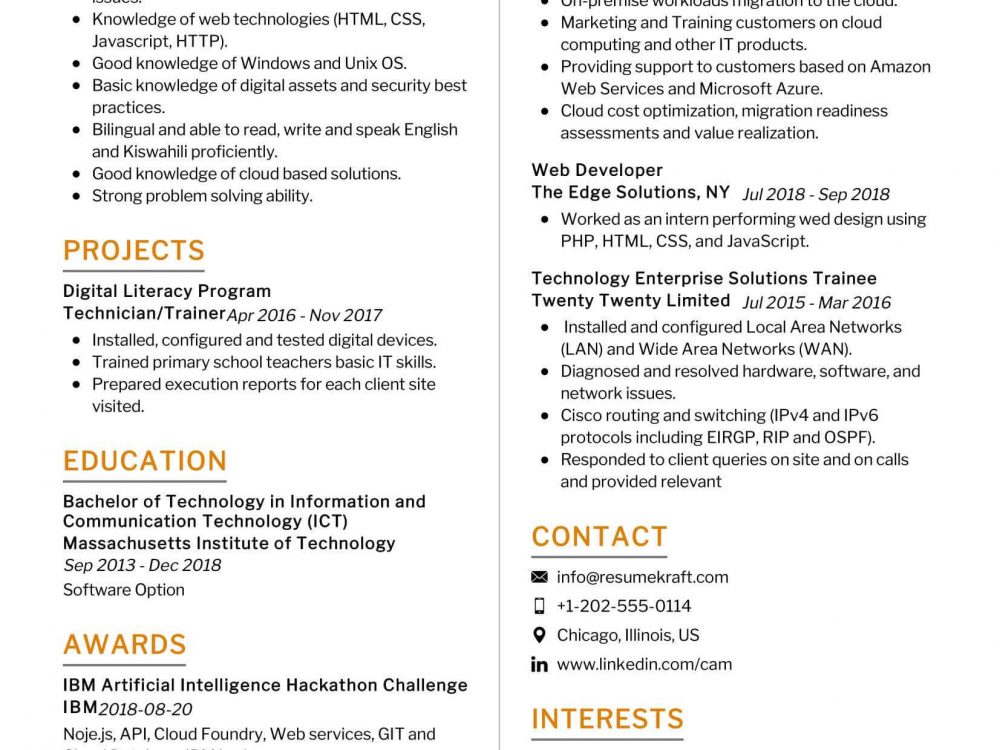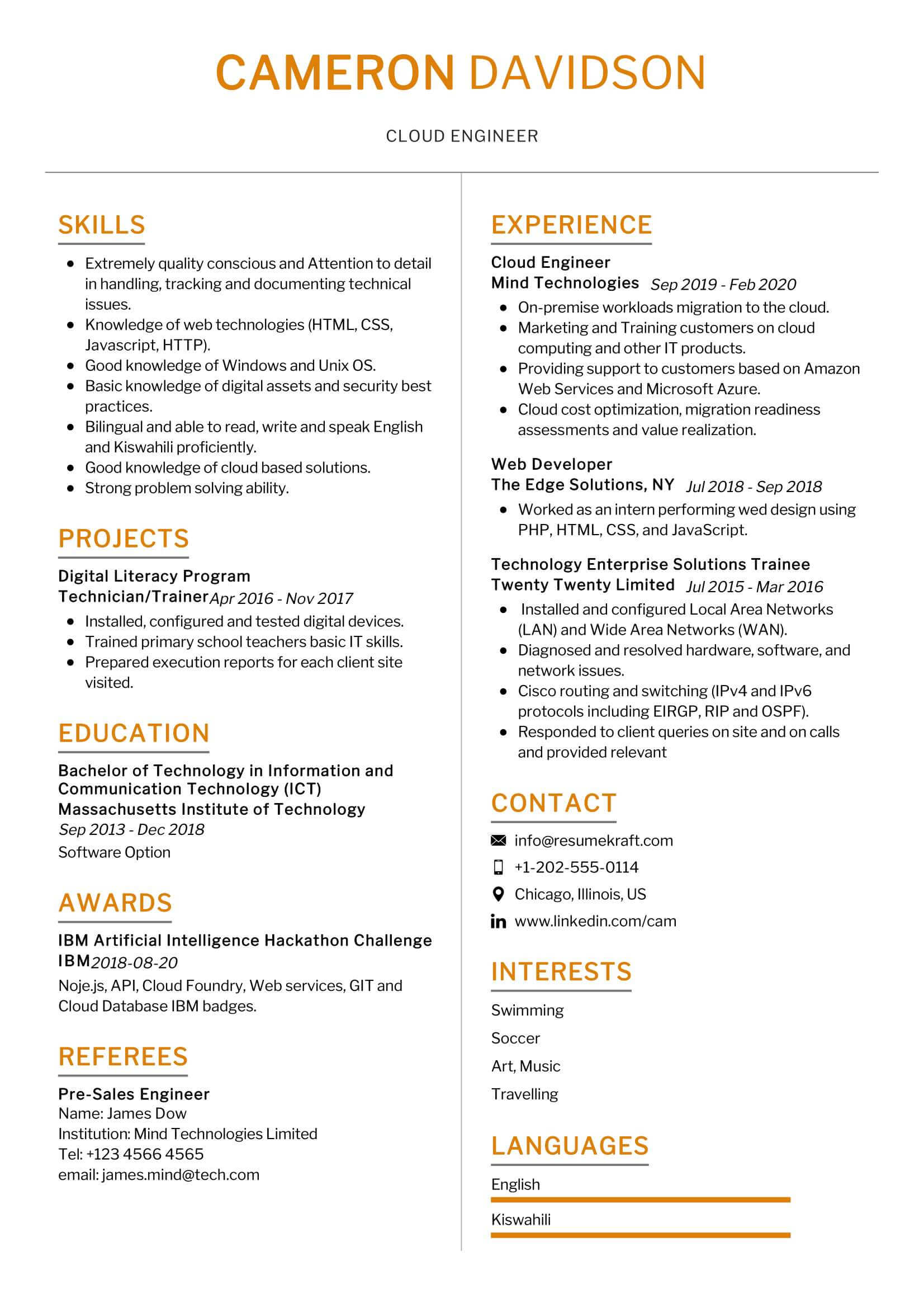Are you a Research Specialist by profession and looking for an exciting career? We have good news for you! use our professional Research Specialist Resume Sample. You don’t have to start writing from scratch. Just click “Edit Resume” and modify it with your details. Update the template fonts and colors have the best chance of landing your dream job. Find more resume samples.
Cloud Engineer Resume Example
CAMERON DAVIDSON
Cloud Engineer
Skills
- Extremely quality conscious and Attention to detail in handling, tracking and documenting technical issues.
- Knowledge of web technologies (HTML, CSS, Javascript, HTTP).
- Good knowledge of Windows and Unix OS.
- Basic knowledge of digital assets and security best practices.
- Bilingual and able to read, write, and speak English and Kiswahili proficiently.
- Good knowledge of cloud-based solutions.
- Strong problem-solving ability.
Work Experience
Cloud Engineer
Mind Technologies
- On-premise workloads migration to the cloud.
- Marketing and Training customers on cloud computing and other IT products.
- Providing support to customers based on Amazon Web Services and Microsoft Azure.
- Cloud cost optimization, migration readiness assessments and value realization.
Web Developer
The Edge Solutions, NY
Worked as an intern performing wed design using PHP, HTML, CSS, and JavaScript.
Technology Enterprise Solutions Trainee
Twenty Twenty Limited
- Installed and configured Local Area Networks (LAN) and Wide Area Networks (WAN).
- Diagnosed and resolved hardware, software, and network issues.
- Cisco routing and switching (IPv4 and IPv6 protocols including EIRGP, RIP and OSPF).
- Responded to client queries on site and on calls and provided relevant
Education
Bachelor of Technology in Information and Communication Technology (ICT)
Massachusetts Institute of Technology
Languages
- French
- English
- German
- Chines
Career Expert Tips:
- Always make sure you choose the perfect resume format to suit your professional experience.
- Ensure that you know how to write a resume in a way that highlights your competencies.
- Check the expert curated popular good CV and resume examples
Cloud Engineer Resume with Writing Guide
In this era of technology, Cloud Engineers are in high demand. This article will provide a resume guide and tips for job seekers looking to enter the field of Cloud Engineering. We’ll provide templates, tips, and best practices to make sure you are able to impress employers with your resume.
If you’re looking for the perfect Cloud Engineer, and want to take the right first step, then we’ve got you covered with our guide.
Cloud Engineer Resume Writing Guide:
- No matter your programming language, keep your resume simple. A non-technical resume will get tossed in the trash. Keep it simple and clean.
- You’ll want to showcase your skills and experience, so keep key words on the resume for keywords like: Python, Django, Linux, Ansible & Puppet etc..
- Include relevant work experience and contact information for a personal reference as well as any relevant certifications or training available that is applicable to the position applied for.
- Add one personal touch by adding a favorite quote to the resume. This will help a potential employer see what type of person you are.
- Finally, stay true to the resume and do not embellish or stretch the truth of your experience and/or skillset, as this will inevitably lead to being discovered and can have negative consequences for your career.
- Do not use technical jargon on your resume for it will be easily skipped and ignored.
- Be proactive in updating yourself with industry trends, new technologies, and job market trends to provide fresh content for your resume. Embrace these new technologies to show employers that you will be important to their business. Employers want to hire people who are current on technology and trends because they know this will help them maintain a competitive edge against other companies.
Cloud Engineer Job Responsibilities:
- Understand and be familiar with common cloud models such as IaaS, PaaS (e.g., Google App Engine), and SaaS (e.g., Salesforce.com).
- Troubleshoot application latency, performance issues, and availability problems.
- Develop tools for monitoring applications, services, and infrastructure components in a cloud computing environment.
- Design, implement, and support secure solutions in cloud computing environments.
- Maintain and improve current cloud-based systems as needed or expected.
- Perform maintenance on service-level agreement (SLA).
- Provide consultation on applications, design, and architecture in a cloud computing environment to users (e.g., senior management).
- Troubleshoot network issues such as bandwidth, TCP/IP performance, packet loss rate, jitter, latency and packet error rate of the network(s).
- Troubleshoot software issues.
- Plan and develop cloud-based disaster recovery solutions.
- Maintain data center and network equipment.
- Troubleshoot storage space, throughput, throughput problems, and disk space issues in public or private cloud environments; maintain storage capacity plan (e.g., backup and restore system).
Top 10 Must-have Cloud Engineer Skills:
- Infrastructure Architecture
- Virtualization
- Performance Optimization
- Security Awareness
- Implementation and Deployment
- Knowledge of Infrastructure-as-a-Service, Public Cloud, or Hybrid Cloud Environments.
- System Administration: Puppet, Chef, SaltStack (or) Shinken
- Experience with a scripting language: Python or Ruby (or) Bash/Shell Scripting Language (or) Perl or PowerShell or TCL/TK
- Experience with Big Data technologies: Hadoop, Hive, MapReduce (or) Spark
- Business Continuity and Disaster Recovery Planning for Cloud Resources (including backups).
- Demonstrated expertise in the use of specialized tools: for example, database management systems that support cloud infrastructures or automation tools such as Puppet Server and Chef Server.
Tips to write a Cloud Engineer Resume Summary:
The first thing people will see on your resume is a summary of your skills and experience. This should be quick and to the point, so you may want to describe your main job skills.
A few things to consider:
Keep it short and sweet, don’t waste space or time here.
Include no more than three job skills (things you can do that aren’t learned in school: programming languages, software proficiencies, etc).
Mention your education if it is relevant; otherwise, leave it out.
Give a broad overview of your experience. Don’t worry about including specifics here, or even job titles.
Cloud Engineer Resume Summary Example:
“Having been responsible for Cloud Engineering in mission-critical environments for the past five years, I can see the improvements being iterated into existing systems to increase efficiency and reduce costs. I am proficient in Google Cloud Platform, AWS, and OpenStack implementations.”
How to write a Cloud Engineer Resume with No experience:
- Use a 3-Ring binder and label it “Cloud Engineer Resume with Writing Guide.”
- Create a section for each category in your resume (Technical Skills, Languages Skilled In, Experience).
- For each section you create, insert a tabbed divider. Label tabs as needed (e.g. Technical Skills| Database| Linux)
- Create a section titled Contact Information and insert tabs as follows: Cell Phone | Skype | Email | Address
- Include a section for each major area of your career (e.g. Engineering, Consulting, Management) and additional tabs labeled as needed.
- For your cover letter, insert the following tabs: Contact Information | References | Resume
How to write a Cloud Engineer Cover Letter:
- Know the company you are applying to: Who you are reaching out to, what technology they use, who their users are, and where their office is located. Always be prepared for a call with a specific name and title. This information will come in handy when writing your cover letter.
- Put your enthusiasm at the top of your resume: When looking for a Cloud Engineer position, it is important to stand out from the crowd. So, instead of including your technical skills on the resume, list why you would be a good fit for the company. This is a great way to show what makes you valuable in the eyes of the company.
- Make a note of your top 3 most valuable assets: Your top 3 most valuable assets are also probably the 3 most impressive things you have ever done. It is important where to list these accomplishments so that it becomes memorable to potential employers.
- Know the company’s technical stack, and use it wisely: This is a great way to show your attention to detail and your knowledge of the company’s ecosystem. If you are applying to cloud provider A, but you also have experience with other cloud providers B and C, this is an easy way for the interviewer to see that you do not pigeon-hole yourself into one type of technology.
- List your relevant skills: Whether you are a cloud engineer or not, you probably have some relevant skills. List them and prove that you are the best engineer for the job.
- Don’t forget to include your contact information: It is always important to include a professional email address, phone number, and LinkedIn profile in your resume. If you do not have a LinkedIn profile yet, create one!
Key Takeaways:
- You will be able to write a resume that highlights your skills and experience for the job you are applying for.
- You will be able to customize your resume and cover letter to highlight your strengths in a way that makes you stand out among the thousands of other applicants.
- You will be able to follow all the formatting guidelines required on a resume and cover letter, which is the main reason it takes some people months to find work even though they are perfect candidates.


